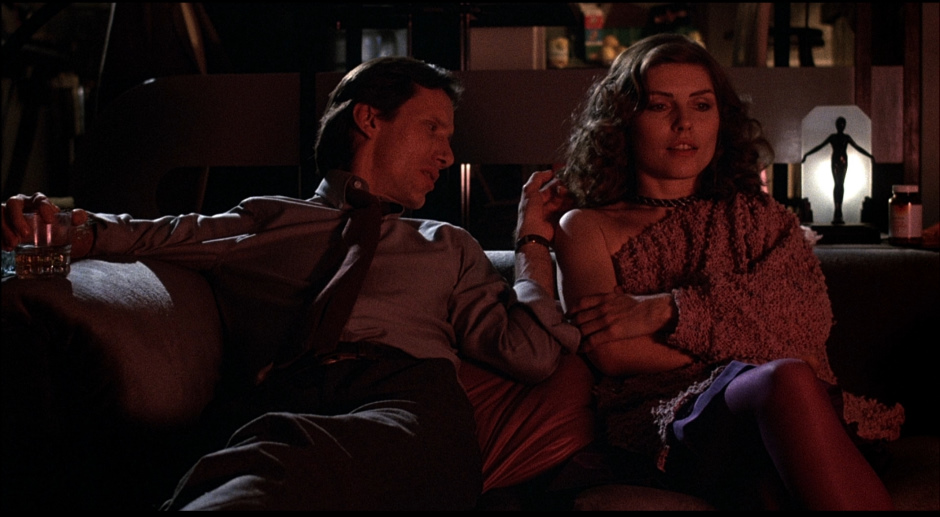Canada | 1983 | Directed by David Cronenberg
Logline: The head of a cable-TV station becomes involved in a mysterious broadcast and finds his reality and future sliding dangerously out of control.
“The television screen is the retina of the mind's eye. Therefore, the television screen is part of the physical structure of the brain. Therefore, whatever appears on the television screen emerges as raw experience for those who watch it. Therefore, television is reality, and reality is less than television.”
Max Renn (James Woods) runs a small television station – Channel 83 Civic TV that focuses on exploitation, but he’s constantly on the lookout for new and exciting material, content that’ll heighten the basic viewing experience, arouse viewers in ways much tougher than the mediocrity he’s been solicited in the past, and he’ll be real cheap and sleazy to purloin it.
When his tech employee Harlan (Peter Dorvsky) decodes a pirate broadcast depicting highly realistic torture and mutilation, known as “Videodrome” Max senses something big. In fact he becomes obsessed with it. This hardcore is a whole new ballgame. He gets hold of his supplier Marsha (Lynne Gorman) to found out who’s responsible. Marsha warns Max that “Videodrome” is real. Meanwhile Max has met and started dating local talk radio celebrity Nicki Brand (Deborah Harry). Nicki, who is openly into S&M, has her interest well and truly piqued when Max introduces her to “Videodrome”.
It soon becomes frighteningly apparent to Max that “Videodrome” is far more sinister than just addictive viewing. Fantasy and reality collide, dream and nightmare merge, and Max becomes both an activist and pawn as he tries to fight against “Videodrome” and is manipulated by “Videodrome” into terrorism.
Videodrome’s screenplay origins began as Network of Blood, a B-movie title if ever there was one. Writer/director Cronenberg’s first two features; Shivers and Rabid owe much to the exploitation genre, but had an socio-political savvy and philosophical streak coursing through their cinematic veins. He continued similar body and psychological horror themes through his next two movies, The Brood and Scanners, but it was with Videodrome that the social discourse of modern consumerism was most deeply entrenched; it even pre-dates cyber-space and reality television, pushing the sex and violence envelope into the deadly realm of “snuffTV”, where the ante has been inexorably raised.
Much of the symbolism in Videodrome is vaginal and phallic. In fact most of Cronenberg’s movies from Shivers through to eXistenZ utilise sexual imagery and metaphor. The director is as much concerned with the corruption of the body as he is with biological creation, birth, and metamorphosis. There’s a fusion of pleasure and pain, of sex and death; the gratification and control of one blurring into the fear and submission of the other. A mesmerizing moment has Nicki beckoning to Max through the television, her sensual mouth filling the screen, the monitor tube convexing to engulf Max’s head as he submits himself to her. This is fellatio and cunnilingus entwined and inverted as a powerful visual motif.
James Woods commands the screen with real intensity, perfectly cast. Debbie Harry’s Nicki slides beside Max exuding a sensuality and vulnerability that perfectly off-sets Renn’s prickly arrogance and unctuous charisma. And then there’s Rick Baker’s outstanding practical effects work, arguably the real star of the show. CGI wouldn’t capture the kind of grungy immediacy that Baker’s special effects does, and there are some truly ingenious set-ups.
Videodrome didn’t fare well upon its initial release, considered too dark and subversive, and its narrative too impenetrable for general consumption. With the original Star Wars trilogy in full flight Joe Average preferred his science fiction with ray-guns and force fields, space ships and robotic villains. The irony is Videodrome features all these elements, only perverted and twisted into provocative, transgressive new shapes and into far more immediate, but outlandish territory. It is a film far more relevant now than it ever was; dark, disturbing, and prophetic, and I strongly doubt the remake, which is currently in development, will be anywhere near as clever, transgressive, or as bleak.
“… Long live the new flesh!”




